Smart Email Marketing: How to Create Personalised Journeys in Marketing Cloud
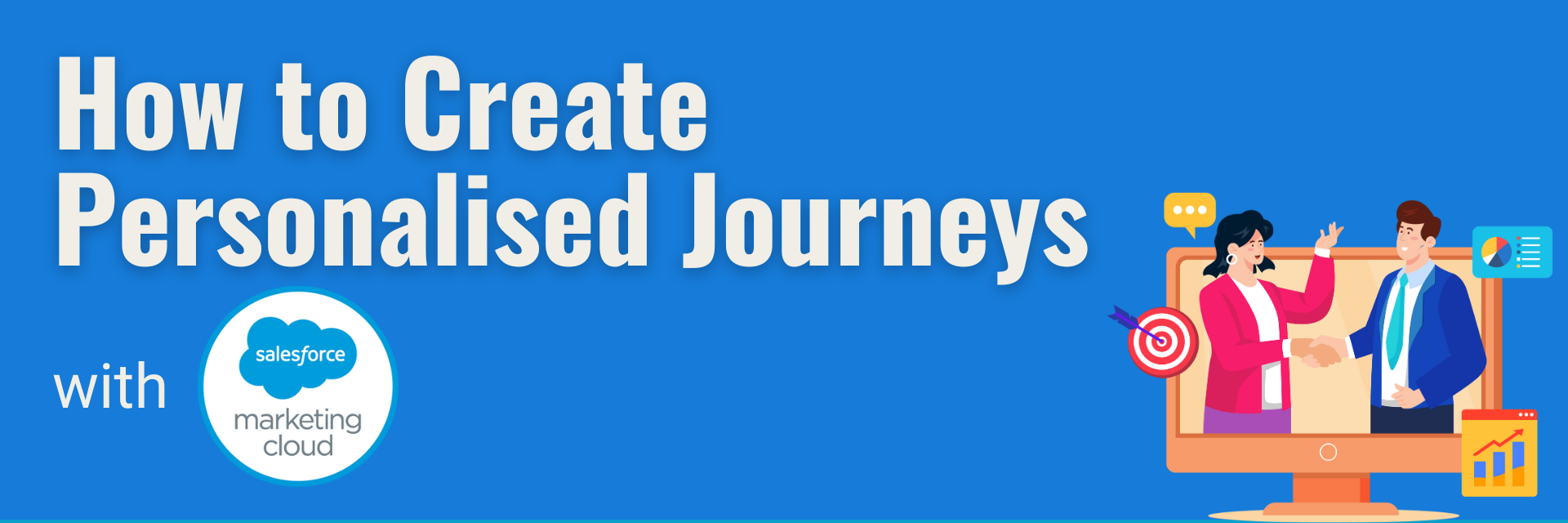
In today’s competitive business, email marketing is no longer just about mass sends. To achieve real results, such as increased conversions, customer loyalty, and lasting engagement, brands need to invest in personalised journeys, relevant content, and artificial intelligence. With Salesforce Marketing Cloud, all of this becomes scalable and automated.
In this article, we’ll explore how to build personalised email journeys using Marketing Cloud, focusing on strategic segmentation, AI-driven personalisation with Einstein, and optimisation through A/B testing and best send times.
1. The Importance of Personalised Journeys
Before getting technical, it’s worth highlighting the value of personalisation: it puts the customer at the centre. Instead of sending the same message to everyone, you build a sequence of communications tailored to the behaviour, preferences, and funnel stage of each contact.
Example: a customer who clicks on a “New Arrivals” email can be automatically placed in a follow-up journey with similar products, while someone who hasn’t opened any emails recently may receive a re-engagement campaign with a special incentive.
This kind of experience is exactly what increases click-through rates, conversions, and customer retention.
2. How to Segment Lists for More Effective Campaigns
Segmentation is the foundation of personalisation. In Marketing Cloud, you can segment using Data Extensions, Audiences, and SQL Queries, with filters based on:
- Demographic data (age, location, gender)
- Behavioural data (clicks, opens, purchase history)
- Declarative data (preferences, signup forms)
- Engagement scores
Additionally, the Audience Builder allows you to create visual segments with cross-filter criteria, for example: “customers who purchased in the last 2 weeks + didn’t open the last 2 emails.”
? Pro tip: Combine simple segments with Contact Builder attributes to create dynamic audiences. E.g.: customers with more than 3 interactions in the past 7 days + declared interest in “technology”.
3. Personalisation with Einstein AI
Einstein’s artificial intelligence within Marketing Cloud allows you to automate and scale personalisation in a smart way. Here are some features you can use directly within email journeys:
Einstein Email Recommendations
Suggests personalised products or content based on browsing behaviour, past purchases, or engagement history.
Einstein Send Time Optimisation (STO)
Analyses each contact’s open behaviour to determine the best individual send time. This means a single email campaign can be delivered at different times for each person, maximising the chance of being opened.
Einstein Engagement Scoring
Classifies contacts into groups (Engaged, Disengaged, etc.), enabling automated decisions like: “If the person is highly engaged, send a direct CTA version; if less engaged, use a softer approach.”
? Pro tip: Use Personalisation Strings and AMPscript to dynamically display details in the email body, such as the person’s name, location, or last product viewed.
4. Best Time to Send Emails and A/B Testing
Time Optimisation with Einstein STO
As mentioned, Send Time Optimisation helps move away from the “send to all at 10 am on a Tuesday” approach. With STO enabled, Marketing Cloud calculates the best possible time to send for each contact, based on past behaviour.
Effective A/B Testing
It’s not just about testing subject lines. Marketing Cloud enables A/B testing for:
- Subject line
- Sender name
- Email content (version A with image X, version B with image Y)
- CTA (Call to Action)
- Send time
- Different layouts
And the best part: you can define a test audience (e.g. 10%), and the winning version (based on open rate, click rate, or conversion) is automatically sent to the remainder of the list.
? Pro tip: Always document your A/B test results and use them to guide future campaigns. A consistent history of testing supports data-driven improvements to your email performance.
5. Building Personalized Journeys with Journey Builder
The Journey Builder is the core of personalised journeys in Marketing Cloud. It allows you to map every step of the customer’s experience and apply logic based on data and behaviour.
Key Components:
- Entry Source: the trigger point (e.g. a new subscriber list)
- Wait Time: defines timing between steps (e.g. wait 3 days before the next email)
- Decision Split: conditional branches (e.g. “did they open the last email?”)
- Email Activity: sends a specific email in each step
- Einstein Split: AI-based decision logic
- Salesforce Data Events: connect with other Salesforce objects like Leads, Opportunities, or Cases
Real-world example: A welcome journey might include 3 emails over 9 days. If the user opens the second email and clicks “View Products”, they can be redirected to a conversion-focused journey.
6. Extra Tips for Smart Email Campaigns
- Avoid over-sending. Set channel frequency limits to prevent inbox fatigue.
- Keep your database clean. Regularly remove inactive or invalid contacts.
- Prioritise mobile design. Most emails are opened on smartphones, ensure your layout is responsive.
- Integrate other channels. Combine your email journeys with SMS, push notifications, and what’s app.
Conclusion
Creating effective email marketing campaigns in Marketing Cloud goes far beyond designing a nice-looking message. It’s about using data, automation, and artificial intelligence to deliver the right message, to the right person, at the right time.
Smart segmentation, AI personalisation with Einstein, strategic A/B testing, and automated journeys form the foundation of truly intelligent, results-oriented email marketing.
With these best practices in place, you’ll not only improve campaign ROI but also strengthen your long-term relationship with customers.
Want to find out more? Fill in the form and we’ll be in touch!
Explore more articles on our blog!
Effective Strategies to Attract Leads with Salesforce Marketing Cloud
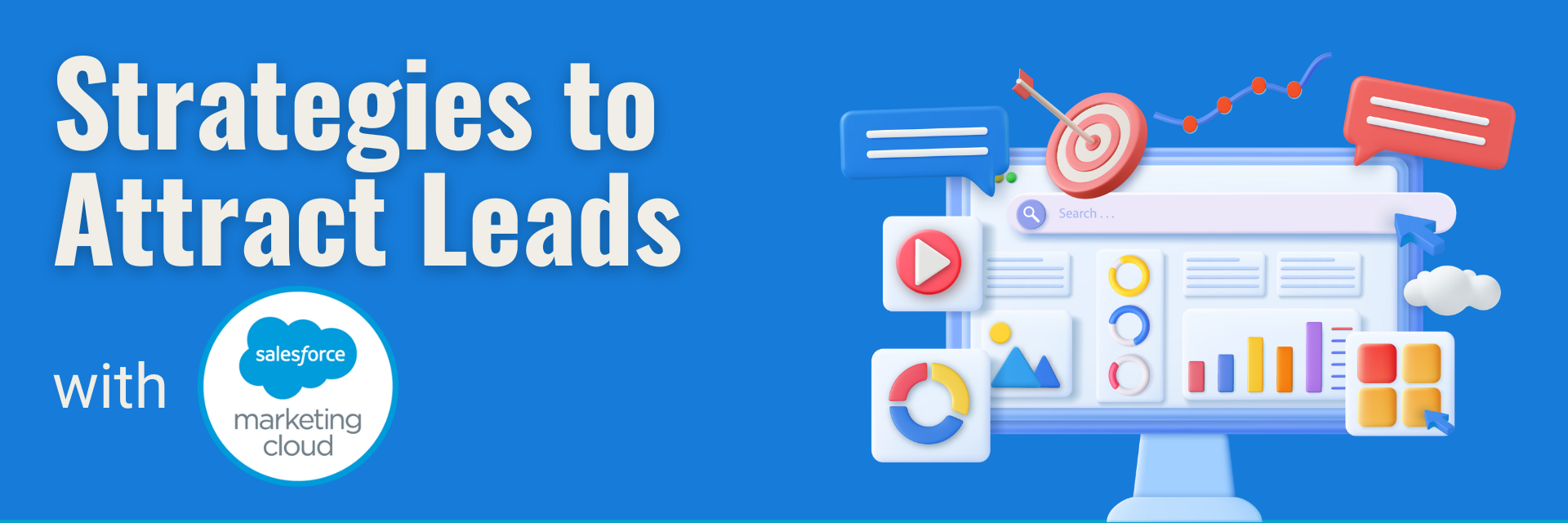
Generating high-quality leads is crucial for the success of any business — and Salesforce Marketing Cloud offers powerful tools to help make that happen. But how can brands leverage this platform to its fullest potential? From compelling design to strategic automation, here are some tried-and-tested strategies from the Target Everest team to help you attract and convert leads effectively.
1. Attractive Design and Strong Functionality
Create Landing Pages that Convert
A well-designed landing page is the cornerstone of any lead generation strategy. Focus on clear, concise messaging, intuitive layout, and a strong call to action. Make sure your forms are simple and user-friendly and remove any friction points that might stop a visitor from converting.
Use Engaging Visuals
Design isn’t just about aesthetics — it’s about experience. Use cohesive branding, strong visual hierarchy, and attention-grabbing imagery to draw users in. A visually compelling page helps build trust and guides the user through the journey.
Keep Accessibility in Mind
An often-overlooked aspect of design is accessibility. Ensuring your landing pages are inclusive — with readable fonts, high colour contrast, and screen-reader compatibility — not only broadens your reach but also improves user satisfaction and credibility.
2. Social Media as a Lead Engine
Promote Campaigns on Social Platforms
Social media is a natural extension of your Marketing Cloud strategy. Use it to raise awareness, promote downloadable content, or link directly to personalised landing pages. Targeted ads and organic content alike can drive qualified traffic to your funnels.
Create Content that Engages
From short videos to interactive polls, engaging content keeps your audience coming back. Focus on value — whether through educational tips, behind-the-scenes content or customer stories. The goal? Build relationships that eventually convert.
Build Trust Through Authenticity
Today’s audiences value transparency. Use social channels to humanise your brand — spotlight your team, share your process, and interact with followers in real time. These small touches foster connection and can lead to long-term loyalty.
3. Email Campaigns and Automation
Design Emails that Stand Out
Avoid clutter. Focus on mobile-friendly, visually consistent layouts with one key message per email. Compelling subject lines and well-placed CTAs will increase open rates and encourage clicks.
Automate the Journey
With Salesforce Marketing Cloud’s Journey Builder, you can guide users through personalised, automated experiences. Whether it’s a welcome series, abandoned cart flow, or post-download nurture track, automation helps maintain relevance and boost engagement.
Use Dynamic Content
Tailor your messaging to different audience segments using dynamic content blocks. With the right data in place, your emails can speak directly to each user’s needs, increasing both relevance and conversion rates.
4. Analyse and Optimise
Keep an Eye on the Data
Tracking performance in real-time is key. Use Marketing Cloud’s reporting features to monitor key metrics like open rates, click-throughs, and conversions. This helps you make informed decisions and pivot quickly.
Test, Learn, Improve
A/B testing isn’t optional — it’s essential. Experiment with subject lines, layouts, CTAs, and visuals to understand what drives the best results. Use those learnings to optimise future campaigns.
Don’t Forget the Long View
While short-term metrics are important, it’s equally critical to evaluate the broader impact of your campaigns over time. Monitor lead quality, customer lifetime value, and retention to understand how your efforts translate into sustained business growth.
5. Real Success Stories
Campaigns that Made a Difference
We’ve seen incredible results from clients using Salesforce Marketing Cloud to manage B2B and B2C campaigns. One hospitality client, for instance, used Einstein Bots to guide guests in real-time — easing pressure on customer service and improving the guest experience.
Team Tips
Our design and social media team recommend always aligning creative with clear KPIs. Less is often more, especially when your goal is to nudge someone towards a specific action.
Consistency is Key
Regular testing and optimisation are important, but so is consistency. Keep your branding, tone of voice, and visual language unified across every touchpoint to reinforce trust and build recognition.
6. What’s Next in Digital Marketing?
Stay Ahead of the Curve
AI-driven personalisation, voice search optimisation, and zero-party data strategies are shaping the future. Salesforce Marketing Cloud is already adapting to these shifts — and so should your strategy.
Adapt and Evolve
Marketing never stands still. Continuously investing in your team’s skills and technology stack ensures you’re ready for what’s next — and always one step ahead in attracting the right leads.
Want to learn more about how Target Everest can help your business grow with Salesforce Marketing Cloud? Let’s talk!
Explore more articles on our blog!
How Salesforce Marketing Cloud Account Engagement Can Boost Lead Generation

Why is lead generation essential for the success of any business?
Lead generation is the foundation for sustainable growth in any business. Qualified leads represent potential customers interested in your products or services, enabling companies to build stronger relationships and increase their sales opportunities. Without an effective lead generation strategy, organisations face challenges in maintaining a consistent flow of new opportunities, jeopardising long-term growth.
Salesforce Marketing Cloud Account Engagement emerges as a powerful solution to address this need. With advanced automation, segmentation, and analytics tools, it enables companies to strategically identify, engage, and qualify leads. In this post, we will explore how this platform can transform your lead generation approach, delivering tangible results and helping you maximise the return on your marketing investment.
What is Salesforce Marketing Cloud Account Engagement?
Salesforce Marketing Cloud Account Engagement, formerly known as Pardot, is a B2B marketing automation platform that connects marketing and sales teams. Its aim is to help manage and nurture leads efficiently, prioritising those most ready for conversion.
The platform’s features include workflow automation for targeted campaigns, activity tracking to monitor lead interactions, and lead scoring to identify the most qualified leads. These tools make the lead generation and conversion process more strategic and effective.

Benefits for Lead Generation
Salesforce Marketing Cloud Account Engagement offers numerous benefits to enhance lead generation. Advanced segmentation enables you to create messages and experiences tailored to each lead’s needs, increasing the relevance of interactions. Intelligent automation ensures that campaigns are delivered in real-time, based on lead behaviour, improving process efficiency.
Moreover, lead monitoring and qualification help identify the most promising opportunities, allowing the sales team to focus on real prospects. Finally, advanced reporting provides detailed metrics, enabling you to measure return on investment (ROI) and adjust campaigns to maximise results.
Use Cases: How to Apply It in Practice
Salesforce Marketing Cloud Account Engagement has proven highly effective for businesses across various industries in lead generation. For instance, in the manufacturing sector, industrial equipment manufacturers use the platform to nurture leads throughout a long and complex sales cycle by offering personalised content and automating interactions with potential clients. Automotive manufacturing companies, on the other hand, use Account Engagement to segment leads based on specific interests, such as new models or technological innovations, and qualify them based on engagement.
In practice, these businesses can integrate landing pages and forms into their campaigns to capture lead information directly from their websites, creating a valuable database for future interactions. Additionally, lead segmentation can be carried out based on characteristics such as industry type, company size, or sales funnel stage, enabling a more personalised and assertive approach that increases conversion rates.
Why Choose Salesforce Marketing Cloud Account Engagement?
Choosing Salesforce Marketing Cloud Account Engagement provides significant advantages over other marketing automation tools. Its scalability allows the platform to grow alongside the business, catering to small businesses and large corporations alike without compromising performance. Integration with other Salesforce products is another key differentiator, offering a unified solution that connects sales, customer service, and marketing, simplifying data management and team alignment.
Furthermore, Salesforce offers global support and is renowned for its continuous innovations, ensuring that companies have access to the latest technologies and industry best practices. These features make Salesforce Marketing Cloud Account Engagement a robust, long-term choice for businesses looking to optimise lead generation and achieve sustainable results.
Transform Your Lead Generation with Salesforce
Engagement is a strategic decision that can drive your company’s growth. Throughout this post, we have discussed how the platform provides advanced segmentation solutions, intelligent automation, and lead qualification, helping you optimise your marketing campaigns and prioritise valuable opportunities. We have also seen how it is successfully applied in various industries, such as manufacturing, and the advantages of its scalability and integration with other Salesforce products.
If you want to take your company’s lead generation to the next level, Salesforce Marketing Cloud Account Engagement is the ideal solution. Schedule a demo or specialised consultation to explore how we can help transform your marketing strategies and maximise your results.
Explore more articles on our blog!
Managing B2B Relationships with Salesforce Marketing Cloud Account Engagement
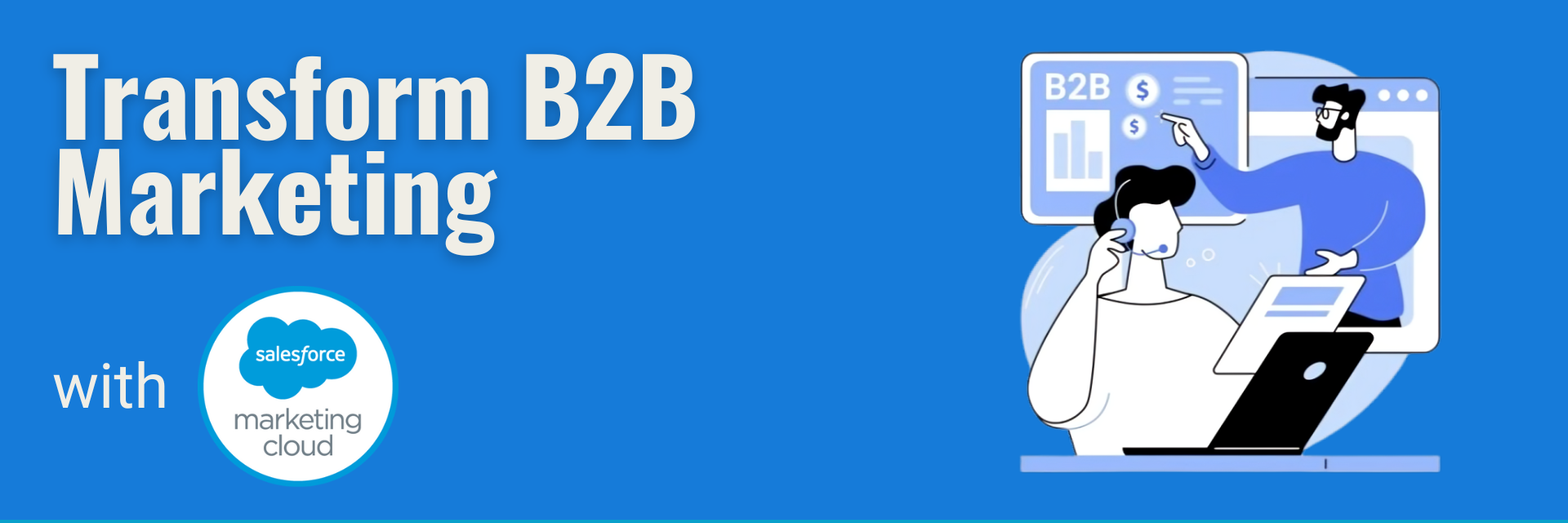
Salesforce Marketing Cloud Account Engagement (MCAE, formerly known as Pardot) is a native Salesforce CRM platform that offers B2B-focused marketing solutions. This platform helps companies manage relationships with leads and customers through its robust tools, such as Lead Scoring and Grading, personalised journeys, automations, and more, helping to nurture, re-engage, and strengthen customer loyalty.
MCAE supports marketing teams in qualifying, nurturing, and aligning their strategies, personalising communications, and automating workflows.
Synchronisation with Salesforce CRM Leads and Contacts
The full integration with Salesforce CRM enables the automatic synchronisation of qualified Leads and Contacts with the CRM. This ensures that both marketing and sales teams have up-to-date, synchronised information about each individual, allowing them to invest in new strategies.
Companies can prioritise marketing efforts by developing campaigns and strategies focused on lead qualification. Once qualified, leads are then passed on to the sales team to begin the sales process. This alignment enables both teams to collaborate effectively, ensuring successful sales outcomes and fostering long-term relationships with customers, promoting loyalty after conversion.
Lead Nurturing
The creation of personalised journeys allows for the development of highly segmented lead nurturing strategies, delivering relevant content at every stage of the customer journey, thus increasing the chances of conversion. Within these journeys, various actions can be configured, such as email sending, field updates, task creation in Salesforce CRM, and more. Additionally, dynamic paths can be built based on specific criteria, such as certain lead fields or whether the customer has opened the email.
Lead Scoring and Grading
These two tools support marketing strategies by enabling precise lead qualification. They allow companies to evaluate a customer’s level of interest in the business and determine whether the lead profile aligns with what the company considers most valuable. This facilitates the transfer of highly qualified leads to the sales team, optimising time and effort.
Lead Scoring measures a lead’s interest level by evaluating interactions such as website visits, form completions, or content downloads. This tool helps prioritise the most engaged leads, allowing for the creation of segmented journeys and enabling the sales team to focus on leads with the highest scores.
Lead Grading evaluates the lead’s profile against the ideal customer criteria. For example, a company operating exclusively in Portugal would assign a higher grade to leads from Portugal compared to those from other countries. This way, the company can prioritise leads not only based on engagement but also on alignment with the ideal customer profile.
Reports and Performance Analysis
Salesforce Marketing Cloud Account Engagement offers valuable reports, such as the Prospect Lifecycle. This report details the entire journey of the prospect, from their first interaction with the company, through conversion and qualification, to becoming a sales opportunity. It also provides insights into the number of successful deals and the revenue generated from these conversions.
Another important report is campaign analysis, which allows the tracking of campaign effectiveness by measuring KPIs such as conversion rate, opportunities generated, and campaign ROI.
One of the key benefits of Salesforce integration is the ability to gain a comprehensive view of the customer journey, from the first contact to the final sale, making it easier to analyse the customer lifecycle.
B2B Marketing Automation
B2B campaign automations reduce manual work by sending personalised communications automatically, based on lead interactions or changes to specific fields.
Automations allow for the configuration of various actions to be triggered at the right time and for the right person, ensuring the relevance of the content, and on a large scale.
Advanced Segmentation
MCAE enables the creation of highly segmented B2B audiences based on demographic, geographic, and behavioural data. Static or dynamic audiences can be defined, ensuring that information is only sent to the right people, maintaining the relevance of communication.
A well-structured segmentation strategy has a significant impact on the lead lifecycle, accelerating sales and connecting marketing and sales teams with the right leads at the right time.
Effective B2B Relationship Management
Effective B2B relationship management with Salesforce Marketing Cloud Account Engagement is essential for maximising lead interaction and conversion potential. The synchronisation of leads and contacts with Salesforce CRM ensures that all relevant information is centralised, providing a complete view of the customer or prospect.
Lead nurturing enables the building of stronger, more personalised relationships, with targeted messaging throughout the customer journey. Automations optimise processes, facilitating the creation of highly personalised campaigns, while reports offer performance analysis and valuable insights.
Together, these integrated tools provide efficient management, enhancing B2B relationships and driving commercial results.
Interested in learning more about Salesforce Marketing Cloud Account Engagement? Fill out the form, and we’ll get in touch with you soon.
Explore more articles on our blog!
Personalising the Customer Journey with Marketing Cloud Engagement
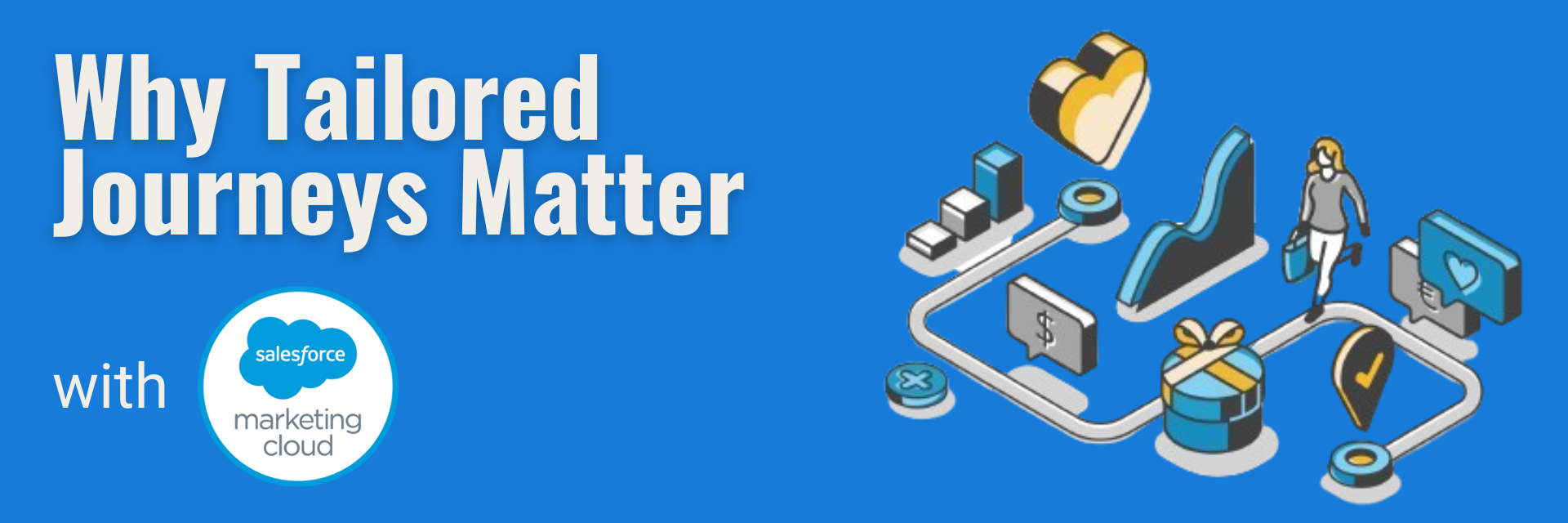
Salesforce Marketing Cloud is Salesforce’s B2C-focused tool that helps businesses deliver relevant campaigns and personalised content to each customer, while also supporting the development of customer journeys. Personalisation in marketing is essential to creating content that aligns with the profile and expectations of each customer. By leveraging online behaviour and even purchase history, companies can segment their audiences and create personalised experiences across various touchpoints, from awareness to loyalty. With the different Studios and Builders in Salesforce Marketing Cloud, it’s possible to create unique and innovative experiences, and even use artificial intelligence to enhance content and journey personalisation by predicting needs and adjusting communication to what is most convenient for each individual.
The Importance of Personalisation
Even though customers may like the same product or service category, each one has different tastes and needs. Personalising the experience helps increase engagement with a company’s content and even promote a closer relationship with the customer by delivering messages and offers tailored to their needs and interests.
Personalisation ensures a more genuine and unique experience because a customer with specific tastes and behaviours can build a relationship of trust with a company that knows them and delivers exactly what they need. Imagine a customer from a children’s store who bought a size 20 pair of shoes for their child, receiving an email six months later with special offers for size 21? It may seem simple, but knowing that the company understands them and their family, and even knows their child’s current shoe size, could be a significant advantage, don’t you think?
Intelligent Segmentation
For intelligent segmentation, it’s important to build detailed and targeted profiles to send specific messages in the Customer Journeys.
It’s essential not only to personalise the customer experience at each touchpoint, from awareness to loyalty, but also to create intelligent segmentation to build effective and personalised campaigns that make sense in crafting the overall experience.
How to achieve intelligent segmentation?
It is possible to create segmentations based on demographic, geographic, and even behavioural data, such as customers who have purchased in the last six months, customers who haven’t purchased in the last three months, regular customers, and those needing re-engagement, allowing for the sending of personalised customer journeys and improving the precision of content.
Using Data and Content for Personalisation
With Salesforce Marketing Cloud, it’s possible to gather data through forms and surveys and even collect real-time data on online behaviour and purchase history. An online store could send personalised content to someone who had a negative experience with a product or service (giving it a low rating), expressing that their opinion is valued, their points of view will be reviewed, and perhaps even offering a discount on another product or service to demonstrate that not all experiences are negative and to seek their trust again. Or they could create an Abandoned Cart Journey, reminding the customer of the items left in the cart and that they still have time to complete the purchase. What an amazing customer Journey, don’t you think?
The more data a company has about a customer, the more personalised the content can become, and the stronger the connection with the customer will be. Within a single email, hundreds of different experiences could be offered, each tailored to the individual desires and needs of the customers, speaking directly to each one.
Another important consideration is the use of A/B testing, as this tool allows companies to test different personalisation approaches and identify which one generates the most engagement and conversion.
Marketing Automation and Omnichannel in Customer Journeys
The Journey Builder is a powerful tool within Marketing Cloud. It allows personalised content to be sent at scale while still targeting distinct profiles and behaviours. With Journey Builder, it’s possible to send messages at the right moment for each customer, using AI tools, for example, to deliver the message at the best time for each individual, based on their behaviour. A single journey working for each individual. Amazing!
The customer experience can be delivered across multiple channels in the Customer Journey (Email, SMS, WhatsApp, etc.) while still respecting each individual’s preferences. The key is to maintain a consistent narrative across all the touchpoints where the customer interacts.
Salesforce Marketing Cloud is a highly powerful tool for attracting, retaining, and keeping customers close to a company. By personalising content, it’s possible to reach audiences with varied tastes and behaviours, offering them exactly what they need at the right moment. Additionally, with automated journeys working for the company, it will have happy and satisfied customers while the platform works autonomously, driving more engagement and results.
Interested in learning more about Salesforce Marketing Cloud? Complete the form, and we’ll get in touch with you soon
Do you want to hear more?
Our team of experts specializes in Salesforce and is dedicated to providing top-notch services to help your business succeed. If you're looking for Salesforce® solutions or have any questions, please feel free to reach out to us. We'd love to hear from you.
Contact us

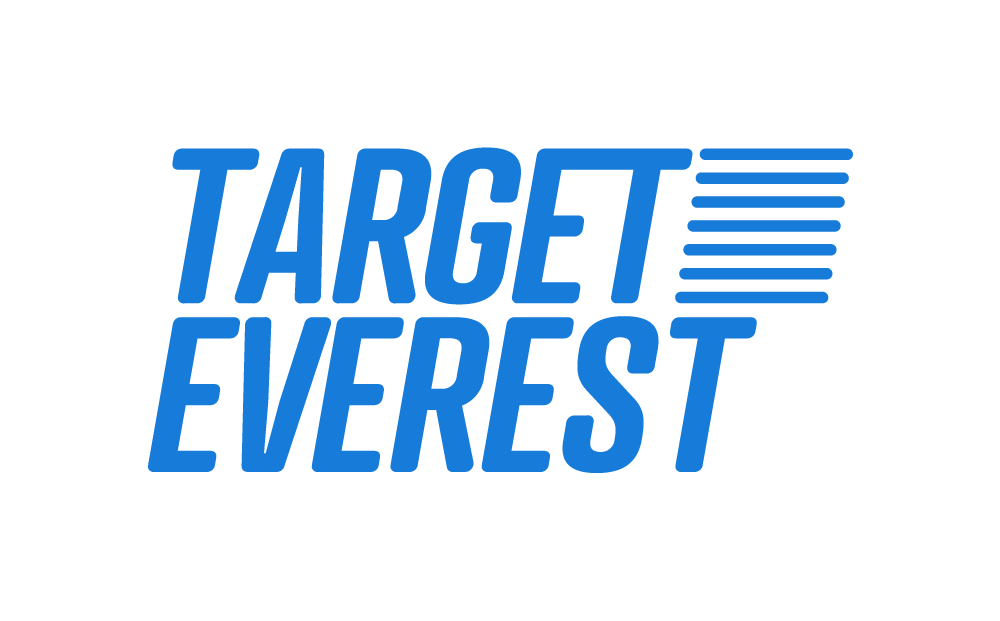 Target Everest |
Target Everest |